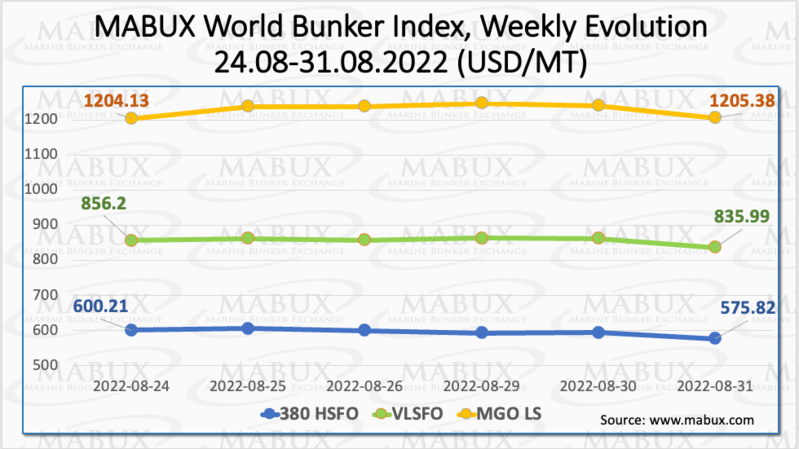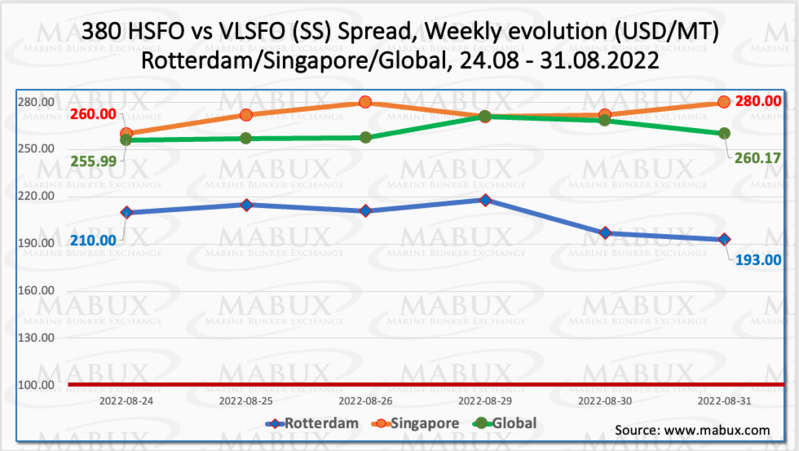No firm trend is expected in the Global bunker market next week, while irregular fluctuations may prevail
The Weekly Outlook was contributed by Marine Bunker Exchange (MABUX)
Over the Week 35 MABUX global bunker indices continued slight irregular changes with no firm trend. The 380 HSFO index dropped by 24.39 USD: from 600.21 USD/MT last week to 575.82 USD/MT, falling again below 600 USD. The VLSFO index also lost 20.21 USD: from 856.20 USD/MT to 835.99 USD/MT. The MGO index, on the contrary, added 1.25 USD (from 1204.13 USD/MT to 1205.38 USD/MT).
The Global Scrubber Spread (SS) weekly average - the price differential between 380 HSFO and VLSFO - has started to rise again after dropping for six straight weeks - plus $15.67 ($261.79 vs. $246.12 last week). In Rotterdam, the average SS Spread decreased slightly to $207.33 from $208.83 (down $1.50 from last week). In Singapore, the average weekly price differential of 380 HSFO/VLSFO showed an uptrend: plus $32.17 ($272.50 vs. $240.33 last week). At the moment there is not a firm trend of SS Spread in Global bunker market. More information is available in the Price Differences section of mabux.com.
Benchmark power prices in Europe are breaking records, as natural gas supply from Russia continues to be limited ahead of the winter. The EU energy ministers are set to hold an emergency meeting to discuss the crisis on September 9 in Prague. LNG as a bunker fuel at the port of Sines (Portugal) rose on August 29 by another 537 USD/MT and amounted to 4765 USD/MT (versus 4228 USD/MT a week earlier) – a record price level. LNG price index is more than three times the cost of the most expensive conventional fuel grade: MGO LS was quoted at 1333 USD/MT in the port of Sines on August 29.
Over the Week 35, the MDI index (comparison of MABUX MBP Index (market bunker prices) vs MABUX DBP Index (MABUX digital bunker benchmark)) showed an undervaluation of 380 HSFO fuel in three of the four selected ports: Houston remains the only overestimated hub: plus $ 4. In other ports, the underpricing premium grew moderately and amounted to: Rotterdam - minus $44, Singapore - minus $104 and Fujairah - minus $108.
VLSFO fuel grade, according to MDI, remained, on the contrary, overpriced in all four selected ports: plus $19 in Rotterdam, plus $46 in Singapore, plus $75 in Fujairah and plus $48 in Houston. All ports demonstrated a downward trend in overcharge margins.
As for MGO LS, MDI index registered an overestimation of this fuel grade in only one port: Fujairah - plus $ 149. In other ports, MGO LS fuel remained underestimated: Rotterdam - minus $ 12, Singapore - minus $ 57 and Houston - minus $ 6. The overcharge ratio in Fujairah fell by 56 points over the week. The underpricing grew slightly in Rotterdam and Singapore, but declined in Houston.
The Clean Arctic Alliance has written to ministers from Norway, Denmark, Iceland, Greenland and the Faroe Islands to propose a number of domestic and international actions which it says will help to rapidly kick-start the establishment of green corridors in Arctic waters. Among the measures proposed includes banning the use of heavy fuel oil (HFO) within the 12 nautical territorial limit of each country’s domestic waters. The Alliance also said that waivers that would allow the continued use of HFO should be refused, along with a prohibition on the use of scrubbers and the discharge of scrubber wastewater into the ocean. Additionally, the Alliance has called on Nordic environment and climate ministers to lead efforts within the Arctic Council to strengthen its black carbon target to reduce emissions by at least 50% by 2030. Another measure to support green shipping corridors, said the Alliance, would be the development of an emission control area in the Norwegian and Greenland Seas, including Iceland’s waters, which it argues would identify an area where sulphur and nitrogen oxides (SOx and NOx) emissions from ships would need to be more stringently controlled.
No firm trend is expected in the Global bunker market next week, while irregular fluctuations may prevail.
By Sergey Ivanov, Director, MABUX







